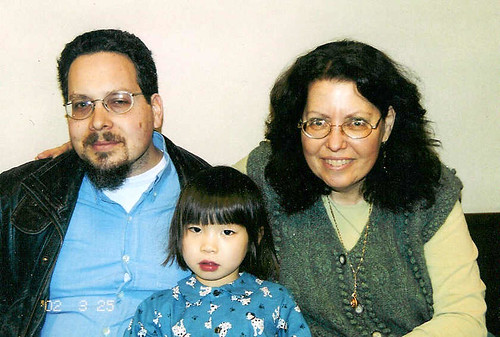I'm with Picasso and "Fernande in a Black Mantilla" looking tragic with turpentine like rain running down her shoulder
And I'm in Pontoise with Pisarro
And with Gauguin in "The Vanilla Grove"
And in the "Mountains of St. Remy" with Van Gogh
And at "The Bend in the Road through the Forest" with Cézanne
And with Vuillard in "The Place Vintimille"
And with Picasso and "El Loco" and his blue acrobats
And with Picasso shaking his fist at the sky in "Guernica"
And I'm Durer's Steeple-jack
seen by Marianne Moore
And those harpies "The Demoiselles of Avignon" are glaring at me personally
And Degas' ballet dancers are dancing for Matisse and Monet and Renoir and all the Sunday painters of Paris and John Sloane and all the Sunday painters of America and most of the painters of the Hudson River School floating along so calm and holding hands with most of the West Coast Figurative painters and their Have a Nice Day cohorts
But I'm also with Malevich in his "Red Square" in the Beautiful Corner
And with Delacroix' "Liberty Leading the Masses"
And with Goya's groaning masses in "The Disasters of War"
And I'm rocking across the Atlantic with "Whistler's Mother"
And I'm crossing the Delaware with Washington standing in the boat against Navy regulations
And I'm with Bierstadt crossing the Rockies on a mule
And with Motherwell and DeKooning and Kline and Pollock and Larry Rivers in the broken light in the shaken light of the late late late twentieth century
And then I'm walking through a huge exhibition in the Whole World Museum of Art containing all the greatest paintings of the entire fine arts tradition of all the centuries of western civilization
When suddenly a wild-haired band bursts into the Museum and starts spraying paint-solvent onto all the paintings
And all the paint in all the paintings starts to run down onto the floors of all the galleries forming fantastic new and exciting images of the end of our little universe
And elite curators in Gucci shoes rush in and cut up the painted floors and hang them on the walls while picturesque bohemian painters in berets stagger through the halls weeping
posted afternoon of March 24th, 2012: 3 responses
➳ More posts about Pretty Pictures
 |
Saturday, October 18th, 2014
In one of his classes, Amalfitano said: the birth of modern Latin American poetry is marked by two poems. The first is "The Soliloquy of the Individual," by Nicanor Parra, published in Poemas y antipoemas, Editorial Nascimento, Chile, 1954. The second is "Trip to New York," by Ernesto Cardenal, published in a Mexico City magazine in the mid-'70s (1974, I think, but don't quote me on that), which I have in Ernesto Cardenal's Antología, Editorial Laia, Barcelona, 1978. Of course, Cardenal had already written "Zero Hour," "Psalms," "Homage to the American Indians," and "Coplas on the Death of Merton," but it's "Trip to New York" that to me marks the turning point, the definitive fork in the road. "Trip" and "Soliloquy" are the two faces of modern poetry, the devil and the angel, respectively (and let us not forget the curious fact -- though it may be much more than that -- that in "Trip" Ernesto Cardenal mentions Nicanor Parra). This is perhaps the most lucid and terrible moment, after which the sky grows dark and the storm is unleashed.Those who disagree can sit here and wait for Don Horacio Tregua, those who agree can follow me.
--Roberto Bolaño, Woes of the True Policeman
So then, here they are: - Parra, Soliloquio del individuo, translated by Ferlinghetti as "Soliloquy of the Individual" -- here is a recording of Ginsberg reading the translation, though annoyingly cut off before the end. Here is a recording of Parra reading.
- Cardenal, Trip to New York. (Annoying -- this is a Google Books preview and only the first page is available; I haven't been able to find a link to the original text.) (Or possibly there are more than one poem of that title by Cardenal -- I just found a link to the first page of a poem called Viaje a Nueva York which begins differently than that one.) (Update -- we'll know soon enough, I just bought the 78 Laia AntologÃa via AbeBooks...)
posted morning of October 18th, 2014: Respond
➳ More posts about Roberto Bolaño
|

